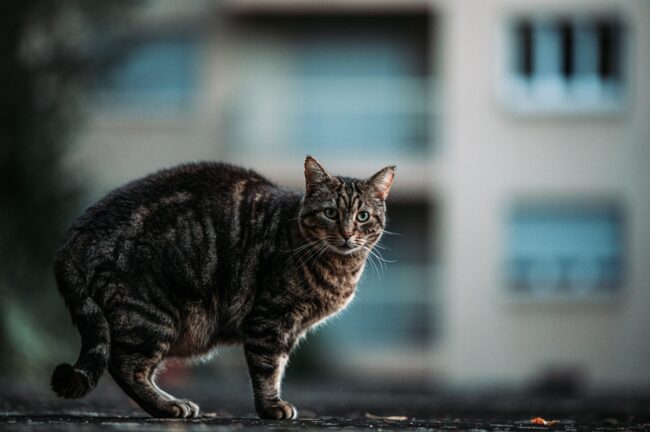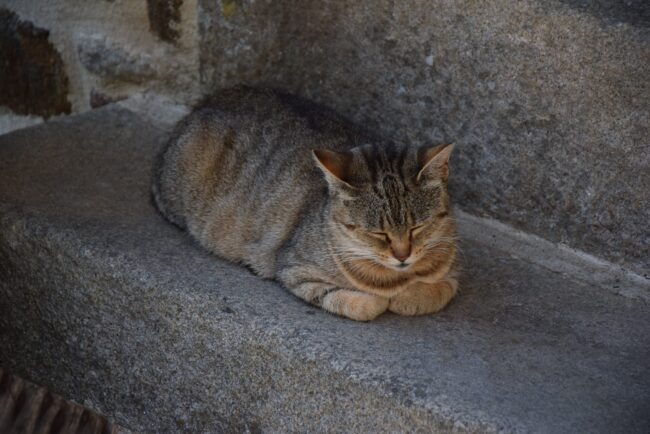Table of Contents
A diabetic cat is prone to several health complications from organ damage. One of the most reported problems in diabetic cats is a swollen stomach. A bloated cat can suggest a wide range of ailments. A swollen stomach can occur quickly and should be treated as a serious condition with quick diagnosis and treatment.
In this post, let us try to understand the reasons for a swollen stomach in diabetic cats. We also discuss the treatment options and home remedies for bloating in cats.
My Cat has a Swollen Stomach – A Complete Guide
A diabetic cat can suffer from a wide range of medical conditions, including a swollen stomach. If your cat’s abdomen looks larger than normal and bulges outside the body, it means it needs close monitoring. A cat’s stomach can experience swelling for many reasons depending on gender and age. It can be normal for some felines though it can indicate some serious underlying problems for others.
See if the stomach has grown larger over time and your cat is getting overweight. If your cat is old or lazy, eats a lot and does not exercise, it can become overweight and have an enlarged belly. Sometimes, your cat’s internal organs can either work at a reduced rate or fail. This causes fluid accumulation in the abdomen. A swollen stomach can signify kidney, liver or heart failure. This is particularly true for diabetic cats and should be diagnosed and addressed promptly.
If your diabetic cat shows an enlarged stomach, you should consider taking it to the vet to evaluate the condition and get proper advice on the cause and treatment options.
Distended Stomach In Cats
Visible swelling of the stomach area suggests a distended stomach in cats though it is accompanied by other symptoms that help you identify the underlying cause. Some of the most common symptoms seen in cats with distended stomach include weakness, lethargy, vomiting, diarrhea, appetite loss, increased vocalization, hair loss, collapse, flatulence, weight loss and more.
This condition can be related to a more serious illness in the cat, so it is best to consult a vet who will examine to determine if the stomach contains air, solids or liquids. Other tests like x-ray, ultrasound and urine analysis can help reveal the cause of the problem. The vet may also test for the function of internal organs and look for signs of a tumor.
The treatment for a distended stomach will depend on the diagnosis. Abdominocentesis is used to drain fluid and relieve pressure on the organs. The vet may also use diuretics to drain excess fluid from the body. Any tumorous growths will need surgical procedures. Antibiotics may be used to eliminate the harmful bacteria if the cat is diagnosed with an infection. Deworming medications may be prescribed if the cat is found to have parasites or worms.
Cat Distended Stomach Causes
As the stomach contains several organs, a distended stomach can be caused by several different problems. Some of the most common causes of a distended stomach in cats include:
Viral or Bacterial Infection – An infection such as feline infectious peritonitis is generally responsible for distended bellies. The common symptoms of this condition include weight loss, appetite loss, abdominal enlargement and lethargy.
Worm Infection – Hookworms, roundworms and tapeworms are common parasitic worms found in a cat’s gastrointestinal tract causing abdominal distention. There are several anti-parasitic treatments available for this condition.
Obesity – Middle-aged to senior cats are largely prone to weight gain with activity and underlying health conditions. A vet can suggest some diet changes and exercises to help these cats.
Pyometra – A life-threatening condition with symptoms like fever, lethargy, dehydration, abdominal pain and others, Pyometra can be treated with antibiotics and fluid treatment to address stomach distention in cats.
Food Intolerance – An adverse reaction to a food item or its additives can cause this issue with symptoms like diarrhea, vomiting, itching and discomfort. To resolve this problem, your vet can help identify the foods to avoid in the cat’s diet.
Cancer – Cancerous and non-cancerous tumors developing in the abdominal area, can cause stomach distention in cats. The symptoms and treatment depend on the type of cancer and the organ affected.
Some other causes of a distended stomach in cats include pregnancy, liver or kidney diseases, heart failure, Cushing’s disease, foreign body consumption and injury.
Home Remedies For Bloated Cats
If you find that your cat is bloated with symptoms like constipation, nausea, vomiting or lethargy, it could simply mean it has an upset stomach. A cat can have a bloated stomach for several reasons, and it is important to make it feel better as quickly as you can. Sometimes, home remedies work well to provide the felines with some instant relief.
Your cat might suffer from an allergy to a food or food change. You can try giving bland food to help the cat ease its upset stomach while providing the right nutrition. Make bland food by mixing chicken and rice in a ratio of 1:4. Remove all the fat, skin, and bones from the chicken and cook it to make bland food. You can replace chicken with turkey or cottage cheese as well.
In case your cat shows other symptoms like vomiting or nausea, you should use fasting for your cat to give the stomach some time to heal. Remove the cat’s water and food for about 12 hours, then introduce water and some bland food. Apart from these solutions, several herbs and special diets work for bloating in cats. You can give catnip or ginger to your feline to relieve it of bloating. You can even buy dry foods formulated to be easily tolerated by sensitive stomachs.
Old Cat Bloated Belly – Here’s What To Do
An ageing cat is vulnerable to various serious illnesses and end-stage problems. This is why you should react quickly to any such symptoms and note any signs of pain or illness. Your old cat might just be getting fat if you see an enlarged belly with no other symptoms or discomfort. However, if you feel that it is not overweight or fat, you should take the cat to the vet as soon as possible to diagnose the underlying condition.
With age, cats are likely to suffer from several infections, organ failures and even cancer. Your veterinarian would perform the necessary tests and evaluation to find out the reasons for bloated belly, and suggest an action plan. He may advise food changes and medications if it is just a stomach issue. For any more serious problem, the cat should undergo proper screening, blood and urine tests and other diagnostics to give you a clear idea of what is wrong.


